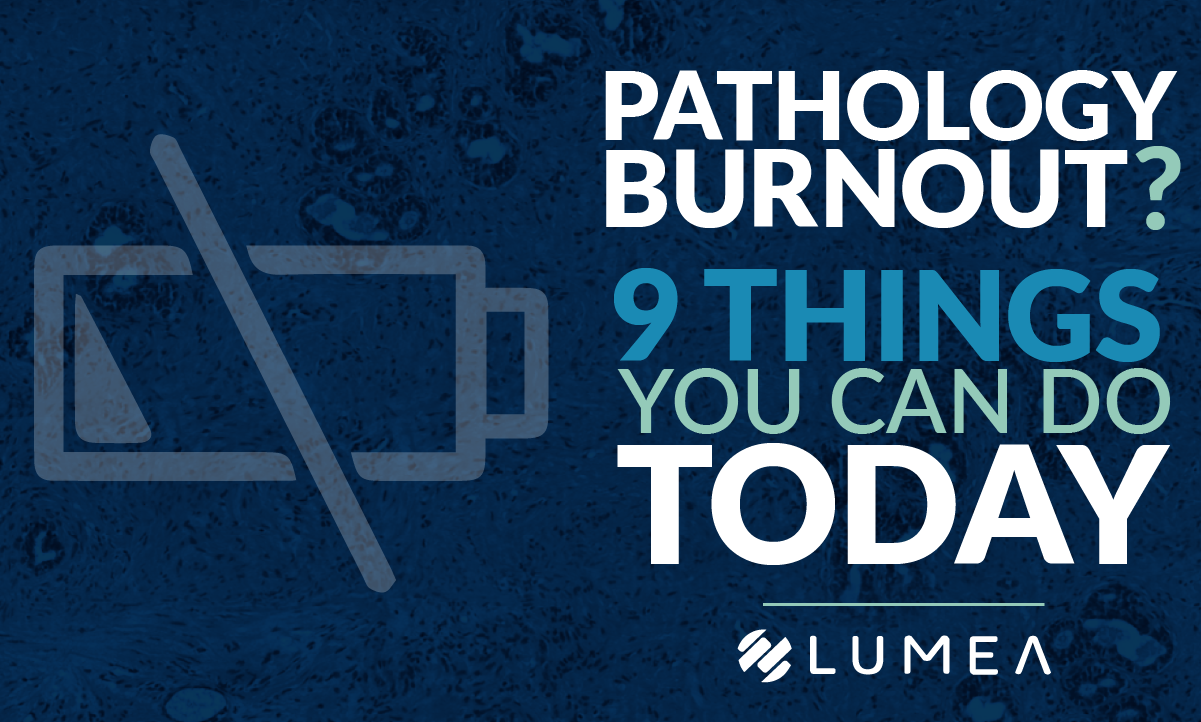We recently published an article about pathology burnout that discusses the steady rise of depression, burnout, and suicidal ideation in the medical field. In fact, recent studies found that 1 in 3 pathologists are experiencing burnout, and 1 in 10 have suicidal thoughts. How can you know if you are experiencing burnout, and what can you do? Read more to learn the 9 things you can do today to help reduce pathology burnout.
What is job burnout?
Job burnout is stress from work that manifests itself with physical and emotional exhaustion. You can experience it when you feel overworked, underappreciated, perceive a lack of control, disagree with work values, or have a poor work-life balance. Some stress at work can be positive, but too much can become overwhelming and tiring. Burnout isn’t a medical diagnosis, but the things that cause it can lead to conditions like depression.
How can I know if I have burnout?
There are a few telltale signs of burnout. If you are experiencing some of these symptoms, you might have job burnout. Your symptoms could, however, be signs of other problems. When in doubt, seek professional help.
To identify if you are experiencing job burnout, take some time to examine your life. In the last few months or over the past year, have you experienced an increase in any of the following: irritability, dissatisfaction with work, emotional exhaustion, high blood pressure, headaches, lower productivity, lack of motivation, or feelings of detachment? If you answered yes, then you may have job burnout.
How can I reduce burnout?
There are a variety of things you can do to help reduce or alleviate burnout. Everyone is different, so there is no secret, a one-fits-all approach to decreasing burnout. However, here is a list of things you can try.
Make time for hobbies
Making time for hobbies improves mental health and emotional well-being. Research suggests that people who engage in frequent leisure activities have better psychological and physical functioning. They also experience more life satisfaction, lower depression, lower blood pressure, and perceive better physical function.
Exercise regularly
Exercise can boost physical and mental energy, it releases endorphins that can improve mood, relieves tension and stress, and promotes positive feelings. It also provides a break from the rest of the day, which can help you take your mind off your daily worries. A Harvard study discovered that even doing something as simple as 15 minutes of running or 1 hour of brisk walking daily can decrease the odds of major depression by 26%. This proves that even a little exercise goes a long way in improving mental health.
Get good sleep
Sleep restores well-being and helps protect health. Are you getting enough high-quality rest? If not, try these suggestions: change your sleep habits by getting to bed earlier in the evening, avoid coffee and alcohol before bedtime, remove electronics from your bedroom, meditate, stretch, try progressive muscle relaxation, or create a calming bedtime routine. If you need more help, reach out to your doctor for advice.
Eat healthily
Good nutrition can improve your overall well-being. When experiencing anxiety or stress, it’s easy to reach for the nearest sweet or treat. Unhealthy food makes us feel great! At least temporarily. However, you can create a dependence on those happy feelings you get from eating sugar. There is also a connection between sugar and depression. A study discovered that men who eat more sugar are 23% more likely to be diagnosed with clinical depression. You probably don’t have to cut sugar out of your life completely, but try to find healthy alternatives and eat a balanced diet.
Address it at work
Evaluate your workday. Are there things that could change at work that would reduce your burnout? Discuss your concerns with a supervisor and see if you can find a solution together. Something as simple as a change in expectations, a new compromise, reprioritizing tasks, or increased flexibility and autonomy can improve your work atmosphere. You could also ask for more recognition or gratitude at work. A good employer would be more than willing to help, especially if you are a good employee.
Practice mindfulness
Mindfulness means focusing on your breathing and being intensely aware of what you’re sensing and feeling in the moment. To apply this to work, face every situation and aspect of your job with openness and patience. Practice being kind to yourself and others as you take every day, one moment at a time.
Identify stressors
Take some time to meditate about the last few weeks or months. You may want to start with today. As you meditate, write down what events or situations were most stressful. Were there specific triggers that increased your stress? For example, maybe you get stressed when a coworker talks to you. Knowing your triggers will help you avoid or reduce your exposure to them.
Try to find the root of the problem. Why does talking with this coworker make you stressed? Maybe you like to focus at work. Every time they come by your desk to talk, they interrupt your train of thought. They probably have no idea they’re causing you stress. Address the problem with them, explain that being interrupted causes stress, and suggest a solution or alternative.
Take a day off
When was the last time you took a vacation? Maybe what you need is a break from the office. Take a day off to relax and evaluate your life. You can even try some of the suggestions above to boost your mental and emotional health.
Seek support
You can find support with family or friends, in the workplace, or even on social platforms online. A support circle that is there for you when you need them is invaluable. Just having someone to talk to can make the difference some days.
In addition, you may want to consider getting professional help. A therapist, counselor, or life coach can make a big difference. Everyone can benefit from talking with a professional third party who can help sort out their concerns and suggest things to help. You might even discover that what you thought was job burnout was a symptom of an underlying health issue. When in doubt, talk it out.
Mental health resources for pathologists
If you have suicidal thoughts or symptoms that may indicate a possible mental health diagnosis, you can find help. Regardless of the severity of your situation or symptoms, these resources are here to help you.
Physician Support Line: 888-409-0141, or www.physiciansupportline.com
National Suicide Prevention Lifeline: 800-273-8255, or, Text 741741, or http://suicidepreventionlifeline.org/
PeerRXm Med: www.peerrxmed.com.
American Foundation for Suicide Prevention: afsp.org/suicide-prevention-for-healthcare-professionals

As digital pathology gains popularity and momentum, it may create new ways for pathologists to deal with or prevent burnout. For example, some artificial intelligence applications can take over the more mundane aspects of the job, freeing up pathologists to do what they enjoy most. What are your favorite things to do that reduce pathology burnout, stress, anxiety, and depression? Subscribe to our monthly newsletter for more stories like this.











